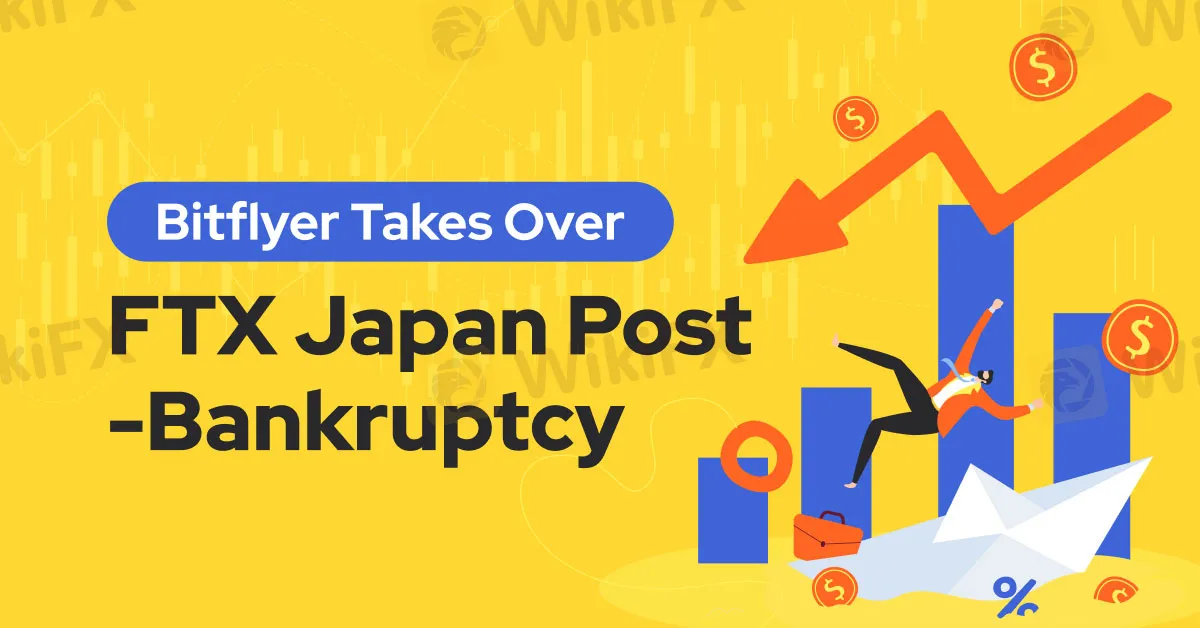简体中文
繁體中文
English
Pусский
日本語
ภาษาไทย
Tiếng Việt
Bahasa Indonesia
Español
हिन्दी
Filippiiniläinen
Français
Deutsch
Português
Türkçe
한국어
العربية
Bitflyer Takes Over FTX Japan Post-Bankruptcy
Abstract:BitFlyer Holdings announced on June 20 that it would be acquiring and rebranding FTX Japan. Post-acquisition, FTX Japan will shift its focus from running a crypto exchange to providing institutional-grade crypto custody services.

FTX Japan is reportedly set to be acquired by the Japanese cryptocurrency exchange BitFlyer, as announced by Japan's public broadcasting service.
NHK reported on Thursday that BitFlyer plans to spend several billion yen to purchase all shares of FTX Japan, thereby gaining full control of the company.
BitFlyer Holdings announced on June 20 that it would be acquiring and rebranding FTX Japan. Post-acquisition, FTX Japan will shift its focus from running a crypto exchange to providing institutional-grade crypto custody services. Initially, it will be renamed New Custody Company until a final name is decided.

BitFlyer stated that the acquired platform plans to offer services related to crypto exchange-traded funds (ETFs), which have not yet been introduced in Japan. These services will be designed to meet the needs of financial institutions such as trust banks, pending the establishment of the necessary legal framework and tax regulations for crypto asset spot ETFs in Japan.
Moreover, the New Custody Company will manage the transfer of FTX Japan customer accounts to BitFlyer, contingent on customer consent.
According to Nikkei, the acquisition cost BitFlyer several billion yen, amounting to tens of millions of dollars. FTX Japan, originally known as Liquid, was purchased and rebranded by Sam Bankman-Fried's FTX in early 2022, shortly before FTX's collapse in November 2022.
Following FTX's failure, FTX Japan maintained that its customers' assets were separate from FTX's bankruptcy proceedings. As a result, FTX Japan resumed withdrawals and reimbursed its customers in February 2023.
In 2022, FTX was actively acquiring crypto companies, including the $1.4 billion acquisition of the crypto brokerage firm Voyager Digital in October. In April 2024, a U.S. judge authorized FTX's debtors to enter a $450 million settlement with bankrupt Voyager.
This development follows Sam Bankman-Fried's recent sentencing to 25 years in prison in the United States after being convicted on seven felony charges.

Disclaimer:
The views in this article only represent the author's personal views, and do not constitute investment advice on this platform. This platform does not guarantee the accuracy, completeness and timeliness of the information in the article, and will not be liable for any loss caused by the use of or reliance on the information in the article.
Read more

The Ultimate Guide to Automated Forex Trading in 2025
Modern markets are revolutionized by automated trading systems, which now execute 70-85% of all transactions. These advanced automated trading software solutions, commonly called trading robots or Expert Advisors (EAs), leverage algorithmic precision for automatic trading across forex, stocks, and commodities 24/7. By removing emotional interference and executing trades in microseconds, auto forex trading platforms create fair opportunities for all market participants. For those new to automated trading for beginners, these systems provide disciplined, backtested strategies while significantly reducing manual effort.

Will natural disasters have an impact on the forex market?
The forex market is known for its rapid responses to global events, but the influence of natural disasters, such as earthquakes and typhoons, can be less straightforward. While headlines may scream about catastrophic damage and economic disruption, the long-term effects on currency values often depend on a blend of immediate shock and underlying economic fundamentals.

Philippines Deports 29 Indonesians Linked to Online Scam Syndicate in Manila
Online scam groups in the Philippines trick Filipinos into gambling and love scams, from Manila to Bacolod, causing trafficking and pain as police fight back.

Why does your mood hinder you from getting the maximum return from an investment?
Investment decisions are rarely made in a vacuum. Aside from the objective data and market trends, our emotions—and our overall mood—play a crucial role in shaping our financial outcomes. Whether you’re feeling overconfident after a win or anxious after a loss, these emotional states can skew your decision-making process, ultimately affecting your investment returns.
WikiFX Broker
Latest News
How Crypto Trading Transforms FX and CFD Brokerage Industry
UK would not hesitate to retaliate against US tariffs - No 10 sources
FCA Warns Against 10 Unlicensed or Clone Firms
CySEC Warns Against 14 Unlicensed Investment Websites
Top Currency Pairs to Watch for Profit This Week - March 31, 2025
Will natural disasters have an impact on the forex market?
Philippines Deports 29 Indonesians Linked to Online Scam Syndicate in Manila
Navigating the Intersection of Forex Markets, AI Technology, and Fintech
Exposed: Deceptive World of Fake Trading Gurus – Don’t Get Fooled!
AI-Powered Strategies to Improve Profits in Forex Trading
Currency Calculator







